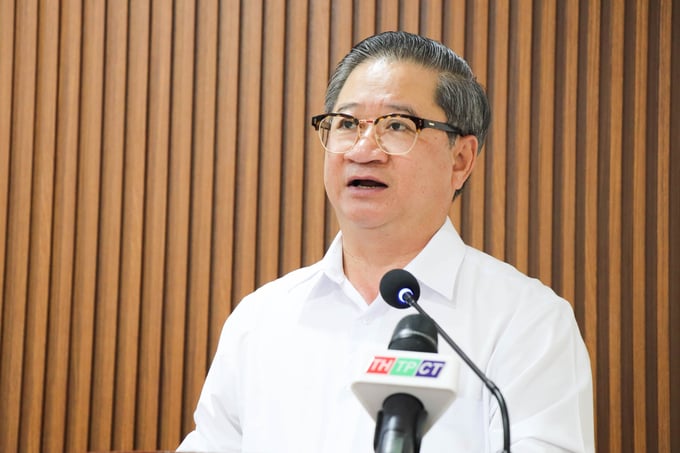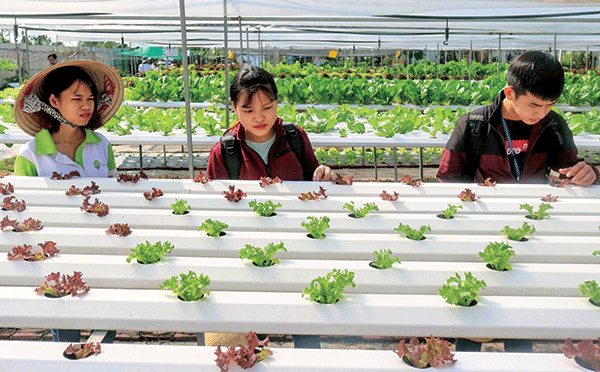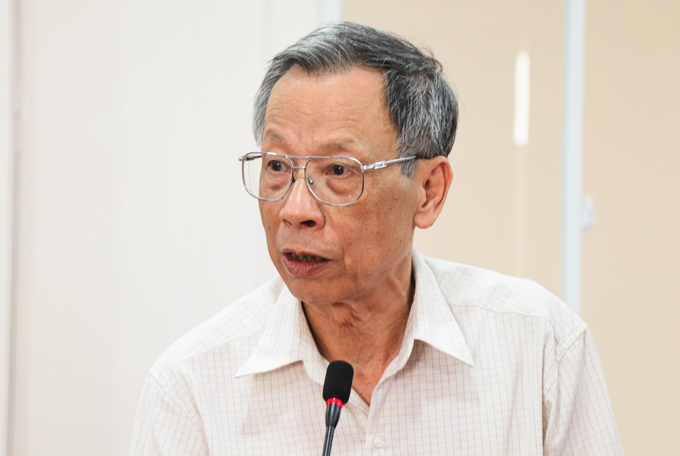November 28, 2025 | 01:27 GMT +7
November 28, 2025 | 01:27 GMT +7
Hotline: 0913.378.918
November 28, 2025 | 01:27 GMT +7
Hotline: 0913.378.918
With its central location, Can Tho City has been identified as a driving force for the development of the whole Mekong Delta region. Over the past time, the city has implemented many key projects in the area to enhance the application of scientific and technological achievements to production and business, improving the competitiveness of products. This attracts domestic and foreign corporations and businesses to invest.

Mr. Tran Viet Truong, Chairman of Can Tho City People's Committee emphasized that the promotion of research, transfer, and application of science and technology is one of the strategic breakthroughs of the city. Photo: Kim Anh.
Currently, research, development, and application of science and technology in the city focus on areas such as: Biotechnology, processing technology, mechanical engineering technology, and automation technology... The achievements in the field of agriculture and the process of purifying resistant rice varieties for breeding work are prominent.
In addition, the program selects and creates top-of-the-line plants for breeding; selects fungal strains to develop into biological products to prevent and treat diseases of rice, vegetables, and fruit trees. Microbial fertilizers for agricultural production have promoted positive effects.
Mr. Ngo Anh Tin, Director of the Department of Science and Technology of Can Tho City said: Currently, the Can Tho Science and Technology Department has cooperated with the Cuu Long Delta Rice Research Institute. They are researching and breeding some new rice varieties, selecting varieties suitable to the city's development conditions in association with promoting the Can Tho rice brand.

Can Tho City is promoting many programs and projects on science and technology to serve the development orientation of high-tech agriculture.
Prof. Dr. Nguyen Ke Tuan, a senior lecturer at National Economics University, said that science and technology have contributed to a clear change in agricultural production in the Mekong Delta in particular and the country in general. However, compared to other countries in the world, the development of science and technology has not really become a driving force for the domestic economy.
Currently, the number of Vietnamese businesses equipped with advanced technology is only about 1%, the rest is moderate and outdated, Mr. Tuan said. Currently, the number of Vietnamese enterprises equipped with advanced technology is only about 1%, the rest is only average and outdated, Mr. Tuan said. According to Mr. Tuan, Vietnam's labor productivity is still low compared to some countries in the region. In addition, out of the total number of businesses in Vietnam, 98% are small and medium-sized businesses.
Facing those challenges, the Department of Science and Technology has advised the People's Committee of Can Tho City to issue a comprehensive plan. The plan will deploy a series of topics and projects at the regional and local level applying science and technology by 2030. At the same time, support for start-ups to complete products and ideas.
Prof. Dr. Nguyen Ke Tuan, a senior lecturer at National Economics University, said that, compared to other countries in the world, the development of science and technology has not really become a driving force for the domestic economy.

Prof. Dr. Nguyen Ke Tuan, a senior lecturer at National Economics University, said that, compared to other countries in the world, the development of science and technology has not really become a driving force for the domestic economy. Photo: Kim Anh.
In addition, the city's science and technology industry also diversified its agriculture processing products and applied information technology to build a digital map of agro-forestry-fishery management. Currently, Can Tho City is implementing the planning and construction procedures for a centralized information technology park, Can Tho hi-tech park, and 3 hi-tech agricultural zones.
Prof. Dr. Tran Thi Van Hoa, a Member of the Central Council of Theoretical Studies, said that in order to develop Can Tho City, transforming it into a driving force of the Mekong Delta, Can Tho City is facing many big challenges from lack of connectivity in transport infrastructure. This also includes problems relating to human resources, mechanisms, and policies, the gap between the Party's guidelines and policies, and actual implementation. Therefore, Can Tho City needs to put the development in the central position. The growth engine of the Mekong Delta region is to spread, strengthen regional linkages, and identify science and technology in the right position as the foundation.
Translated by Hoang Duy

(VAN) On November 27, in the meeting with Minister Tran Duc Thang, Mayor Yin Yong shared Beijing’s experience to improve environment and air quality.

(VAN) After 30 years, both sides identified strategic areas of cooperation: sustainable production, increasing coffee value and training for farmers.
/2025/11/27/4910-4-164708_294.jpg)
(VAN) On the afternoon of November 27 in Beijing, Minister of Agriculture and Environment Tran Duc Thang held a working session with several major Chinese enterprises operating in the agriculture and environment sector.

(VAN) The Department of Animal Health issued a provisional guideline requesting local authorities to increase surveillance, collect samples for testing, and conduct epidemiological investigations according to the established procedure.

(VAN) The United Nations recommends that Vietnam utilize data and artificial intelligence to enhance early disaster warnings and reduce GDP losses by 3.2% in the context of climate change.

(VAN) On the morning of November 27 in Beijing, Minister Tran Duc Thang and the Deputy Commissioner General of the General Administration of Customs of China signed a protocol on fresh jackfruit exports.

(VAN) As floodwaters recede, a vast network of irrigation works across eastern Gia Lai is emerging in a state of severe disrepair, with extensive damage demanding urgent restoration ahead of the 2025-2026 winter-spring cropping season.